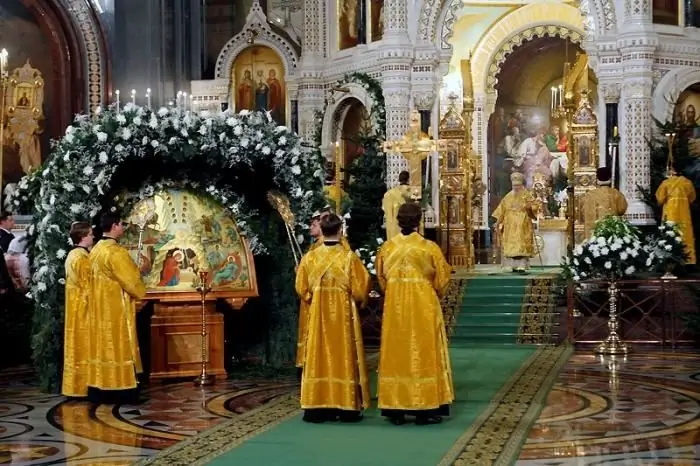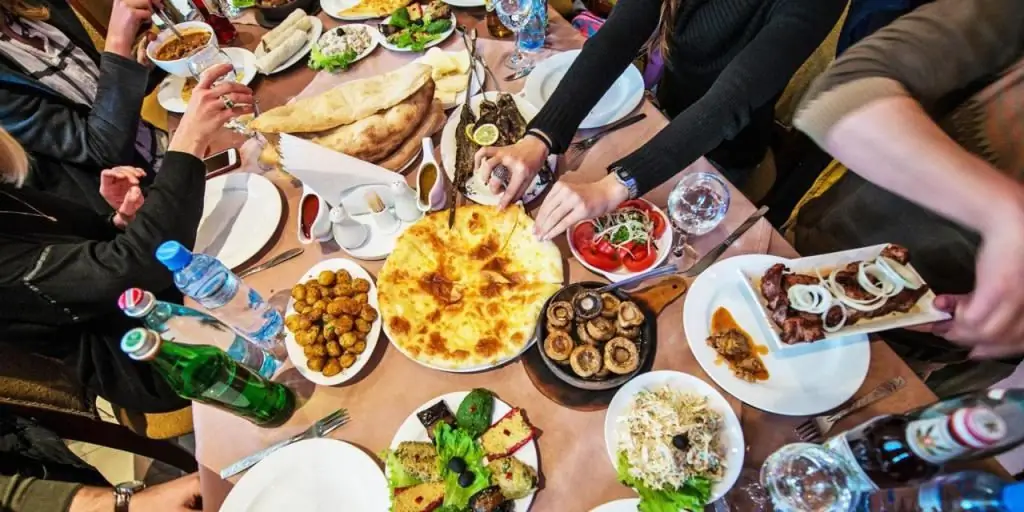2026 Author: Priscilla Miln | miln@babymagazinclub.com. Last modified: 2025-06-01 05:14:29
Holidays in different religions perform a special function for both believers and secular people. For a religious person, such a day is special, as it reminds of some significant event. As for those who prefer to believe in the Almighty in their souls, holidays are also important for such people. After all, they help to distract from everyday worries, to take a break from labor stress for a while.
Christmas traditions in Orthodoxy
At all times, religious holidays have played a special role. One of the most important solemn days for representatives of different religions is Christmas.

In Orthodoxy, this bright day is celebrated on January 7th. The day when there is an intensive preparation for the holiday is Christmas Eve. According to the strict rules of the Orthodox Church, believers must refuse food until the first star appears. Lent precedes Christmas.
Which religious holiday is the most important? It is difficult to answer this question. Each of these days has a special mood. As for Christmas, according to popular beliefs,On the night before Christmas, two forces fight - good and evil. One invites people to carol and celebrate the birth of the Savior, and the second invites people to the witches' sabbath. Once upon a time, this evening, a carol went around the yards - disguised young people in masks of animals. They called the owners of the house, not sparing beautiful words. Of course, such traditions had nothing to do with church ones.

Traditions for Holy Evening
In different countries this religious holiday is celebrated in its own way. For example, in Ukraine, the celebration begins on Holy Evening, Christmas Eve. Before this holiday, the Orthodox Church also prescribes fasting. One of the distinctive traditions is a dish called “kutya”. This is wheat or rice porridge, to which dried fruits, honey, poppy seeds, raisins are added. In total, 12 different Lenten dishes should be served on Holy Evening. On Christmas itself, people hardly went to visit. Only adult married children (with daughters-in-law or sons-in-law) could visit their elderly parents - take "grandfather's dinner."
Do Muslims have Christmas?
And what about the celebration of Christmas in Muslim countries? For many, this question is very interesting. Of course, none of the Muslim theologians calls for celebrating this religious holiday. Moreover, Muslims have their own "analogue" of Christmas - the birthday of the Prophet Muhammad. It is celebrated on the 12th day of the third month of the Muslim calendar, and falls on different holidays every year. However, since Jesus Christ is also considered a prophet within the framework of this religion, Muslims congratulatetheir neighbors and close Christians with this holiday.

The main Muslim holiday
One of the most important religious holidays of the year for all Muslims is Eid al-Adha. It begins 70 days after the end of the Ramadan fast and lasts 3-4 days. The main tradition of this holiday is the sacrifice of a lamb. A ritual ceremony is performed on each of the days of the celebration. Solemn dishes are prepared from the meat of the animal, which are eaten at the meal, or distributed to the poor.

Christmas in the Catholic Church
In many countries, Christmas is both a national and a religious holiday. In the Catholic tradition, Christmas is celebrated according to the Gregorian calendar, from January 25 to January 1. This bright day is preceded by the period of Advent - fasting, during which believers confess in churches. On the eve of Christmas, a special Mass is laid in Catholic churches, which begins exactly at midnight. Christmas trees are set up and decorated in homes during Christmas. This tradition first originated among the Germanic peoples, who considered spruce a symbol of we alth and fertility.

Easter customs
One of the most ancient religious holidays in Russia is Easter. It is one of the most important and celebrates the resurrection of Jesus Christ. It is believed that almost all the traditions of this holiday first appeared in worship. And even folk festivals are always associated with one of the main traditions- breaking the fast after Lent.
One of the main traditions at Easter is the special greetings. Among Orthodox believers, it is customary to christen - to express greetings with the words “Christ is Risen!”, “Truly Risen!”. The words are followed by a threefold kiss. This tradition has been going on since the time of the apostles.
Main rituals for Easter
During Holy Saturday and immediately after the Easter service, the consecration of Easter cakes, eggs, and all food that was prepared for the festive table takes place. Easter eggs symbolize the birth of the Savior. There is a legend according to which Mary Magdalene brought an egg as a gift to the Roman emperor Tiberius, symbolizing the resurrection of Christ. The emperor, however, doubted the history of the resurrection of Christ. He said that just as white eggs cannot turn red, so the dead cannot be resurrected. At that moment, the egg turned red. Despite the fact that today eggs are dyed in different colors, the predominant hue is traditionally red, symbolizing life and rebirth.
One of the traditions in the pre-Easter week is the preparation of the so-called Thursday s alt, which has wonderful healing properties. To do this, on Maundy Thursday (the last Thursday before the celebration of Great Easter), put ordinary s alt in the oven or oven for 10 minutes. Then she is consecrated in the church. According to beliefs, s alt is not only able to heal diseases, but also to keep peace in the family, get rid of the evil eye.

Nativity of the Virgin - September 21
One of the major religious holidays for Orthodox believers is the Nativity of the Blessed Virgin Mary. This holiday is celebrated on September 21, and it was established by the church in the 4th century. On this day the days become shorter and the nights longer. Depending on the weather that was on the day of the Nativity of the Most Holy Ever-Virgin, people determined what autumn would be like and made assumptions about the upcoming winter. For example, it was believed that if on this day the birds rose high into the sky, then the winter would be cold. If the weather was clear, it was believed that it would last until the end of October.
It was not allowed to quarrel on this religious holiday. It was believed that quarrels against the Mother of God especially anger the Lord, because they upset the Virgin Mary. Drinking wine on this day is not allowed. Whoever drinks on this day will suffer for a whole year. On September 21, it is also customary to treat all women with respect, remembering the primordial spark of God in every person.
There were also special traditions on this Orthodox religious holiday. Usually newlyweds were visited on the Mother of God, they were taught to avoid life's mistakes. The hostess baked a festive cake and treated the guests.
Young people also visited their parents that day. They dressed in beautiful clothes, took a baked pie with them and went around the village. The young wife attached a ribbon with the letters “R” and “B” (“Nativity of the Virgin”) to her hair, which was supposed to protect her and her family from the evil eye. In the event that the ribbon was untied, it was believed that someone was jealousyoung, does not wish well.

One of the most important religious holidays of the year is Epiphany. It is celebrated on January 19th. The main tradition on this day is the blessing of water in temples. Once there was an opinion that any tap water on this date becomes holy. However, the clergy emphasize that in any case, the water must be blessed in the church. This water can heal wounds and diseases. She is placed in a corner of the dwelling so that the whole year there will be order and peace in the house. It is also necessary to remember that holy water can lose its beneficial properties if, while collecting it or using it, a person swears with someone.
Recommended:
Russian public holidays, their meaning, history and role in modern society

The article provides a brief overview of public holidays in Russia. A brief history of each holiday will help to better understand the origin of a significant date
Mexican holidays (national and religious): list

On the ancient Mexican land, the main religion today is Catholicism. But before the first conquistadors entered this land, their own established beliefs and traditions already existed here. Today, the culture of Mexico is a fusion of the traditions of Christian and folk culture, this explains the wide variety of holidays celebrated in Mexico
Holidays in Georgia: national holidays and festivals, celebration features

Georgia is a country loved by many. Some people admire her nature. Its culture is multifaceted, its people are multinational. There are a lot of holidays here! Some belong only to ethnic groups, they are celebrated on the basis of Georgian traditions. Others represent the heterogeneity of European and Oriental cultures
Holidays in October 2014. Church and state holidays in October

How can a Russian person do without holidays! We walk with pleasure and in a big way all the days: professional and international, religious and comic - just give us a reason. The first month of the year when you can really turn around, roam with all your heart - October
Honey, Bread and Apple Spas: dates of holidays, their customs and traditions

Many church holidays are important and significant only for truly believing people who attend services every Sunday, but there are in the list of celebrations marked in the Orthodox calendar, those that are loved by many residents of our country and even those who basically doesn't go to church. These include Apple Spas. The date of this holiday, however, is a mystery to many

